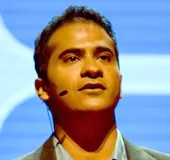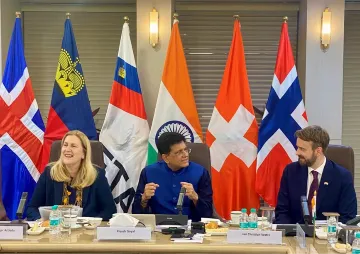
There is perhaps nothing that captures the global imagination like the Football World Cup. In some ways, it is the epitome of globalisation, where 32 unique teams meet, (with many more having valiantly tried) in one country bestowed with the honour of hosting these teams, their fans, their leaders and many others from around the globe. It is a come one and come all party for an entire month. Even though the Olympics on paper may seem to be a bigger global village, it can’t compete with the euphoria of the World Cup. It is one of those rare heterogenous yet homogenous affairs where countries representing every continent, with individuals comprising of an eclectic mix of race, religion, ethnicity and languages all partake. Their languages and culture are unintelligible to many others in the tournament and yet the juxtaposition being they understand each other by speaking only one language, endorsing only religion – Football (Sorry America, this is actual football)!
In some ways, the World Cup is truly a cosmopolitan carnival.
The Financial Times recently carried an Op-Ed on how the World Cup was more of a celebration of globalism at a time of flagrant nationalism (read Trump, Brexit, Erdogan, Le Pen). Of course, globalisation is evident when Mexican fans waved South Korean flags and chanted that they were all Koreans, after South Korea pulled off an unlikely upset over holders Germany, thus booking Mexico a date in the pre-quarterfinal clash. France, tournament finalists and favourites, have a multi-racial squad, with many of their players of Africa origin. Germany’s star players such as Mesut Ozil is of Turkish descent, while the tournament’s all-time top scorer Miroslav Klose, who scored a record 16 times for Die Mannschaft, is of Polish heritage.
After the knockout stages of the World Cup, I put up the following facetious Facebook post comparing the progress of various teams in the tournament akin to events surrounding global geopolitics. Even though purely out of levity, it’s almost hard to separate a global festival like the World Cup from the current spate of world events.
At the start of the tournament, many saw Russia’s chance at hosting the World Cup as a platform for Vladimir Putin to flex his public relations muscle, like he had done during the Sochi Games in 2014.
There were several memes after Germany’s unceremonious ouster, one of them said, “that this wasn’t the first time that Germany had gone to Russia with firepower and unable to get to Moscow”, hinting at the battle of Stalingrad during World War II. While references to Germany of that period are condemned and reviled ad-nauseum, such statements were trending on Twitter.
Mesut Ozil, the same talismanic German midfielder and World Cup winner who has been celebrated by German fans was similarly castigated by his adopted countrymen for flippant loyalties, when he along with Ilkay Gundogan, also of Turkish origin, met Turkish President Recep Tayyip Erdogan. Perhaps there may be some empathy for the German duo from Liverpool and Egyptian superstar Mohamed Salah. The Anfield star inadvertently found himself in a quagmire when he received honorary citizenship from Chechen leader, Ramzan Kadyrov.
It makes no sense, right? Sports and politics should not, must not and cannot mix. But then again, it does make sense.
George Orwell once described sport as “war minus the shooting”. Some would scoff at his eccentric hyperbole. But if there is one thing we have learned through his readings, it is that Orwell’s sagacity is not something that can be easily diluted.
Growing up as an ardent cricketing aficionado in India, I often saw India-Pakistan clashes canceled in the 1990s, as tensions between the South Asian rivals reached a crescendo. Very often the anodyne homily that would resonate among sporting pundits was “let’s not mix, sports with politics”. But therein lies the myopia of assuming, one can effectively compartmentalise human emotions with ease.
The Washington Post accurately said that the World Cup, “is a rare festival of nations, animated by both tribal passions and an unusual, perhaps fleeting, global solidarity”. It’s this tribal passion that evokes nationalistic fervour where fans and players wear this passion on their sleeve. In the case of Swiss footballer Xherdan Shaqiri, he wore his passion literally on his boot.
The Switzerland-Serbia game to the untrained football fan checking the World Cup roster may not evoke any interest. Yet this game splashed all over the headlines for the non-footballing reasons. Switzerland, which has long hosted refugees from various parts of the world, has also been actively involved with peacekeeping operations in the Serbia-Kosovo conflict. And, as a result, provided asylum to several Kosovars seeking protection.
Incidentally, both of Switzerland’s goal scorers against Serbia, Granit Xhaka and Shaqiri, are of Albanian heritage and have roots linked to Kosovo. Both celebrated with a two-handed eagle gesture marking a nationalistic sign for many ethnic Albanians.
For Shaqiri and Xhaka, this was more than just a game. Shaqiri has a flag of Kosovo on his boot while Xhaka spoke about his dad being a political prisoner. Both players have been vocal about their identity.
FIFA was right to clamp down on what it saw as brazen and overt nationalistic gestures by fining the players.
Serbia’s coach Mladen Krstajic avoided controversy by unequivocally stating that “I am not into politics”, however politics found Serbia. Their fans were found in violation of displaying messages with strong political overtones against Costa Rica. And after the European nation defeated Costa Rica, Serbia’s foreign minister gleefully announced that this was revenge, hinting at what he saw as the Central American country’s temerity to be the first to recognise Kosovo’s unilateral independence in 2008.
Another Balkan nation that has captured the tournament by surprise has been finalists Croatia. After the Balkan nation dumped out England in the semi-finals, the meme doing the rounds were that the last time England found themselves in a semi-final (1990 against West Germany), Croatia didn’t exist as a nation.
In fact, the Atlantic did a riveting article on how the dissolution of Yugoslavia in the 1990s, which led to the birth of Croatia, in some sense began at a football match itself. The violence at a game in Zagreb between Serbian fans and Croatian fans propelled Croatian separatists to independence.
Croatia’s assiduous skipper and chief playmaker, Luka Modric, can relate to Xhaka’s story. His family too suffered at the hands of Serbian militia as his grandfather and a handful of relatives were murdered, displacing his entire family.
The tribal passions referred to in The Washington Post article is sort of the Eureka moment that Sherlock Holmes would seek in his deduction. The World Cup maybe an event that comes once in four long years, but national teams are comprised of players representing various clubs across various leagues. The rivalry in club football for certain teams across certain nations has its ideological roots in historic, cultural, sectarian and societal divides.
Two of the biggest clubs in world football adorned with a plethora of stars, Real Madrid-and Barcelona, share a rivalry known as the El Classico. While it’s a great exhibition of a coterie of phenomenal talent, scintillating football and pure entertainment, the rivalry’s roots aren’t confined to purely sporting prestige.
Its roots go back to the Spain-Catalonia rivalry, where Catalonians felt oppressed under military dictator Francisco Franco. Real Madrid was Franco’s club, and Catalonians oppressed, formed the slogan for Barcelona Football Club - Mes Que Un Club, which means “more than a club”. Barcelona Football Club was seen to represent Catalan pride and stood for all things opposed to Franco.
In Glasgow, Scotland, two of the biggest clubs are Celtic and Rangers. These two have long occupied the top echelons of Scottish football and while they lack the global glamour of Real Madrid and Barcelona, their rivalry is based on deep rooted sectarian divides. Celtic, has traditionally had Catholic supporters while Rangers has had a Protestant fan base. The rivalries tie into Ireland’s independence movement, with Celtic fans, Scottish as they may be, carrying Irish flags in a defiant show of Catholic support, while Rangers supporters unfurl the Union Jack, to show their support to the Union.
Yes, at a very kernel level, sport is sport and sport is entertainment and entertainment must be enjoyable and not evoke deep rooted nationalistic fervor or passions of resentment or even be about boisterous chest-thumping.
But sport and nationalism share a common portion of a Venn Diagram. It would be the passion component, and passion can seep into various zones of the good, the bad and the ugly (thank you, Clint Eastwood).
But perhaps Shaquiri explains this passion better when he says, “in football you have emotions. You can see what I did. It was just emotion.’’
The views expressed above belong to the author(s). ORF research and analyses now available on Telegram! Click here to access our curated content — blogs, longforms and interviews.



 There is perhaps nothing that captures the global imagination like the Football World Cup. In some ways, it is the epitome of globalisation, where 32 unique teams meet, (with many more having valiantly tried) in one country bestowed with the honour of hosting these teams, their fans, their leaders and many others from around the globe. It is a come one and come all party for an entire month. Even though the Olympics on paper may seem to be a bigger global village, it can’t compete with the euphoria of the World Cup. It is one of those rare heterogenous yet homogenous affairs where countries representing every continent, with individuals comprising of an eclectic mix of race, religion, ethnicity and languages all partake. Their languages and culture are unintelligible to many others in the tournament and yet the juxtaposition being they understand each other by speaking only one language, endorsing only religion – Football (Sorry America, this is actual football)!
There is perhaps nothing that captures the global imagination like the Football World Cup. In some ways, it is the epitome of globalisation, where 32 unique teams meet, (with many more having valiantly tried) in one country bestowed with the honour of hosting these teams, their fans, their leaders and many others from around the globe. It is a come one and come all party for an entire month. Even though the Olympics on paper may seem to be a bigger global village, it can’t compete with the euphoria of the World Cup. It is one of those rare heterogenous yet homogenous affairs where countries representing every continent, with individuals comprising of an eclectic mix of race, religion, ethnicity and languages all partake. Their languages and culture are unintelligible to many others in the tournament and yet the juxtaposition being they understand each other by speaking only one language, endorsing only religion – Football (Sorry America, this is actual football)!
 PREV
PREV


